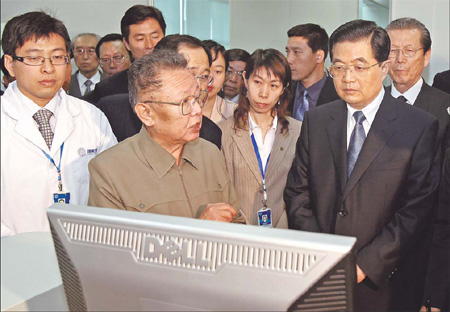DPRK willing to return to nuclear talks, says Kim
Pyongyang is willing to return to the Six-Party Talks on nuclear disarmament, the leader of the Democratic People's Republic of Korea (DPRK) declared on Friday as he wrapped up his fifth visit to China.
|
|
Kim Jong-il's five-day unofficial visit, which started on Monday, came almost exactly a year after the DPRK's second nuclear test last May, one month after Pyongyang said it would withdraw from the Six-Party Talks permanently.
During a meeting with President Hu Jintao inside Beijing's Great Hall of the People, Kim said the DPRK's stance in favor of denuclearization of the Korean Peninsula stays unchanged, Xinhua News Agency reported.
"The DPRK is willing, together with all parties, to discuss creating favorable conditions for restarting the Six-Party Talks," which also includes the United States, the Republic of Korea (ROK), Japan and Russia, said Kim.
"Both sides (China and the DPRK) think all parties of the talks should show their sincerity and make active efforts to promote the Six-Party Talks process," he was quoted as saying in a Xinhua report.
However, analysts say the talks are unlikely to reopen soon despite Kim's positive signals.
"The US and the ROK are not active on (restarting the talks) as they think the nuclear issue in the Korean Peninsula is too complicated. They just don't want the situation to get out of control," said Wang Fan, director of China Foreign Affairs University's institute of international relations.
"There's still no clear timetable to reopen the talks," he said. The DPRK might give up its nuclear plans; Pyongyang just needs a "favorable external environment" to do so, said Wang.
"It needs peace, normal diplomatic ties with regional powers and the US, and trade with the outer world," he said, adding that the countries involved should make "common and coordinated" effort to achieve these things.
The ROK's foreign ministry on Thursday said efforts to restart the talks must wait until Seoul finds out who sank its warship near their disputed border with the DPRK.
A US State Department spokesman said on the same day that Washington would continue to support the ROK as it investigates that incident.
Japanese Foreign Minister Katsuya Okada also said on Friday that he does not think "the talks can move forward unless the issue of the (ROK) ship becomes clear". Although "it is good that there was mention of the Six-Party Talks" when Hu met Kim, he said.
Kim's China visit came amid rising tension between the DPRK and the ROK after the 12,000-ton ROK warship Cheonan sank after a mysterious explosion in late March.
Dozens of sailors were killed and many suspect Pyongyang was behind the incident. ROK politicians have protested Beijing's decision to allow Kim's visit while the sinking is still under investigation.
Jiang Yu, a spokeswoman for China's foreign ministry, said on Thursday that the matter of deciding which foreign leaders are accepted for diplomatic visits is an internal Chinese matter and remains within the scope of sovereignty.
Beijing offered its highest diplomatic courtesy to Kim, as all nine members of the Standing Committee of the Political Bureau of the Communist Party of China met him during his stay, a rare occasion in the country's diplomatic history.
Besides visiting the Chinese capital, Kim also toured some of the country's reform and opening-up fronts, including economic development zones, bonded ports and high-tech companies in Dalian, Liaoning province, and Tianjin.
During each visit to China, Kim has said he can see the achievements made by the Chinese people in building socialism with Chinese characteristics, Xinhua reported.
The achievements are a great encouragement to the DPRK, said Kim, urging his delegation to study the experience of China's renovation of its old industrial base.
The DPRK's development in various fields is progressing orderly and the core task of the ruling party is to constantly improve the living standards of the people, Xinhua quoted Kim as saying.
He also welcomed investment in his country from Chinese enterprises to actively lift the level and quality of bilateral pragmatic cooperation.
The DPRK leader placed great emphasis on economic cooperation during the visit due to a failed currency reform and the rising tension on the Korean Peninsula, analysts said. Trade, aid and investment are desperately needed in the DPRK and Kim's tour was aimed at sending a message that he is interested in economic reform.
Zhou Yongsheng, a Beijing-based researcher on East Asian affairs, said the DPRK has been entangled in a serious economic crisis and China is crucial to the DPRK's fight for economic survival, providing Pyongyang with food, fuel and much-needed investment.
"Kim's visits appeared to be aimed more at overcoming his nation's economic crisis," Zhou said, adding that the country wants to learn from China's 30 years of successful reforms.
However, due to the current situation in the DPRK, it is difficult for Chinese enterprises to invest and do business in the country, he said, adding: "The DPRK needs badly to act according to the international convention and improve its investment environment."
The DPRK's foreign currency supply is steadily drying up after joint economic projects with the ROK were halted.
Little progress has been made, although Pyongyang this year announced plans to set up an international agency called the Taepung International Investment Group and a state development bank to take charge of attracting foreign investments.
 0
0 








Go to Forum >>0 Comments